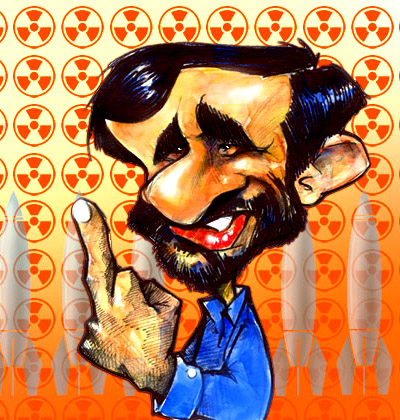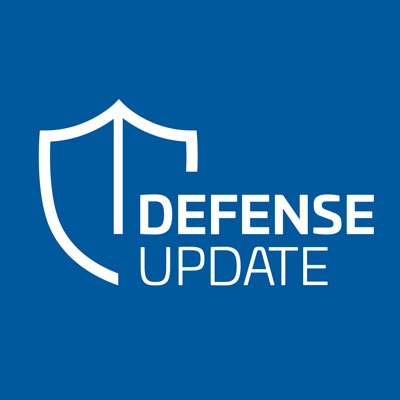
12 Consequences of Attacking Iran
The murdered Israeli leader Gen. Yitzhak Rabin opposed the First Gulf War in 1990, warning that one never knows when starting a war where it will lead. As Bush and the neocons are reportedly planning to attack Iran, we should all think of the likely consequences.
Most Americans already believe that George Bush is not much influenced by facts, but rather by his ideology. Already he is reportedly thinking of his legacy and dreaming that history will prove him "right." More disturbing are his religious beliefs, in particular his daily readings of Scottish preacher Oswald Chambers, who argues that if plans and events go wrong, it just means that God is testing believers' faith, not that strategies should be changed. This may also explain Bush's aversion to diplomacy. After all, God does not "negotiate" with evil. Various reports state that Iran is years away from the ability to produce a single nuke. In a few years' time the government in Iran could easily change or modify its positions; indeed, already President Mahmoud Ahmadinejad is losing power. But time is running out for Bush (although not for America).
An article about Iran in The American Conservative by former CIA officer Phil Giraldi says that Bush may attack before Tony Blair retires in April. Blair has already just sent two British minesweepers to the Gulf. U.S. war plans are reportedly counting on a few weeks of war (as they did with Iraq) to disable Iran's nuclear and military industries. The concept that the U.S. could simply destroy much of Iran then proclaim the war over neglects all the lessons of Iraq, namely that a wounded Muslim nation only gives up when it wants to. Repeatedly, the U.S. loses when we expect enemies to play by American rules.
Following are consequences we must anticipate following such an American attack:
1. Iran wouldblockade the Straits of Hormuz. Iran has new, "state of the art" Russian anti-aircraft defenses as well as powerful Sunburn anti-ship missiles purchased from the Ukraine, Chinese mines, and also itself manufactures other missiles. Anti-ship mines may already be in place, able to be activated from shore.
U.S. strategy calls for destroying all the anti-ship missile emplacements and small missile and mine-laying boats long deployed along Iran's coastline. Obviously, a surprise U.S. attack may miss some Iranian weaponry, or U.S. Navy anti-missile systems may not work to defend all ships in the Gulf. Probably Iran would try to sink tankers (see a projected scenario) to set off a worldwide panic for oil rather than just aim at U.S. Navy ships. Even the threat of this would cause insurance rates to skyrocket and possibly shut down the straits. Just the risk of all this happening should be cause of great concern for America and the whole world.
2. War quickly gets out of hand. U.S. plans to destroy Iran's anti-aircraft and military infrastructure could easily escalate to destroying Iran's oil-loading and shipment facilities. This would take even more millions of barrels off the market for a prolonged period. If Bush/Cheney hadn't shown themselves to be so incompetent, one might imagine it was a plan of their Texas oil friends to raise oil prices to the stratosphere. Jim Cramer warned on MSNBC's Scarborough Country on Jan. 30 that war would quickly drive U.S. gas prices to $5 per gallon.
The far greater risk is that Iran would then retaliate against the hopelessly exposed Kuwaiti, Saudi, and Gulf states oil facilities. Iran has already warned Qatar, where the U.S. has CENTCOM, that its vast gas compression facilities would be targeted if it allows a U.S. attack. Washington announced that it was sending Patriot missiles to defend our "allies," but there is no assurance that these would all work. After all, only one Iranian missile (or ground attack from sympathetic Shias) would need to get through. Also, the Bush administration has made secret the publication of test results for the U.S. anti-missile program. This could easily cover up corruption and incompetence. We already now are finding out that some of our largest defense contractors have designed ships for the Coast Guard that aren't even seaworthy.
3. The whole world's prosperity would be at risk if oil didn't flow again quickly. Any such severe shock to the world economy would cause foreigners to cut back on financing U.S. deficits, with a consequent sharp rise in U.S. interest rates. This would cause very severe repercussions to the whole U.S. economy and government spending. Any real constriction of the Chinese economy would cause a collapse in worldwide commodity prices, with consequent effects on Third World buying power.
4. American citizens and businesses in many nations would be under threat of attack by militant Iranians and other Muslims. War would multiply our terrorist enemies tremendously. Administration officials keep arguing that by fighting in the Middle East we are avoiding terrorist attacks in America. This is the usual American "body count" way of fighting wars. The reasoning assumes that the number of terrorists is somehow finite. But if we keep creating more enemies, we then increase the risk of reprisals inside the U.S.
5. The attack would make America even more suspect and hated in the whole Islamic world. Zbigniew Brzezinski, a former U.S. national security adviser, told Congress the war in Iraq was a calamity and was likely to lead to "a head-on conflict with Iran and with much of the world of Islam at large."
6. War would greatly increase Russian power vis-à-vis Europe as the latter would become even more dependent upon Russian energy supplies. Already a majority of Europeans think that Washington is the greatest threat to world peace. War would severely strain the American alliance.
In Latin America, new, higher oil prices would further strengthen President Hugo Chavez of Venezuela, giving him more money to subsidize further damage against American interests all over the continent.
7. We don't know the effectiveness of the Russian and Chinese weapons that have been sold to Iran. There is a risk that they might be very effective.
8. We might even lose an aircraft carrier. Bush's plan may be to provoke Iran to attack first by putting ships in harm's way in the narrow Gulf. He may be thinking that after such an attack he would have all Americans behind him in retaliating against Iran. It is hard to know what is in his (and Cheney's) mind, but we do know that they are ignorant and full of wishful thinking.
9. American forces in Iraq would be very vulnerable to modern war supplies from Iran, for example, effective anti-tank weaponry such as that used by Hezbollah to destroy dozens of Israeli tanks. The long U.S. supply convoys from Kuwait would be subject to much greater attacks. A sustained Iranian missile attack on the Green Zone in Baghdad or the Doha base camp in Kuwait could kill many Americans.
10. War would curtail the great influence of the religious Right in Washington. Christian fundamentalists are the backbone of support for continuing wars and chaos in the Middle East (see Armageddon Lobby). Their power would finally backfire as more Americans become wary of leaders who claim a direct line to God. The fundamentalists' passion for war, callousness towards the death of foreigners, fear and (almost total) ignorance of the outside world, and unstinting support for police state measures out of Washington have already discredited them among many Americans. Their fomenting another war would be a final blow.
11. The disasters for America could also weaken and challenge the power of the Israel Lobby, especially AIPAC. At least that is the concern of writers at the major xxxish newspaper The Forward. The writers note concern for the perceptions that Israeli interests fomented the attack on Iraq. The antiwar and anti-empire movement is also heavily xxxish, but without "the New York money people" pushing America into war with Iran, as warned by Gen. Wesley Clark.
12. Finally, another war might be the final nail in the Republican coffin for a generation. The party would fracture. Republicans may be the "Daddy Party," which once was thought to provide masculinity to foreign policy, but as James Pinkerton says, "If dad keeps wrecking the car, then there may be reason to change."
News Source: http://www.antiwar.com/utley/?articleid=10477








Comment